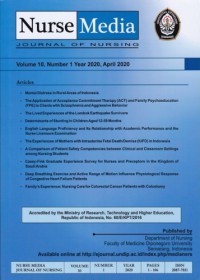
Jurnal
Determinants of Stunting in Children Aged 12-59 Months
Background: Stunting is one of the priority nutritional issues in Indonesia. It is one of the chronic malnutrition effects in children which will have a long-term impact on the growth and cross-generation of mothers through the cycle of stunting syndrome.
Purpose: This study aimed to identify the determinant factors of stunting in children aged 12-59 months.
Methods: Quantitative research with a cross-sectional approach was employed in this study, involving 205 respondents recruited using a consecutive sampling technique. Data were collected using the z scores and questionnaires for children aged 12-59 months, food trust questionnaire, feeding practice questionnaire and child eating habits questionnaire. The Chi Square test and multivariable logistic regression were performed for the data analysis.
Results: Children who were not exclusively breastfed and had major infectious disease had a higher risk of stunting for 53.8% and 40.9%, respectively. There was a significant relationship between the history of exclusive breastfeeding (p=0.001, OR=2.28), the history of infection (p=0.013, OR= 2.27), and eating habits (p=0.04, OR=1.55) with stunting in children.
Conclusion: There is a relationship between the history of exclusive breastfeeding, the history of infection and eating habits of children with stunting. The formation of a peer group community of children aged 12-59 months is expected to prevent and overcome stunting and improve nutritional status and optimal development of the children.
Availability
No copy data
Detail Information
- Series Title
-
Nurse Media Journal of Nursing, Vol. 10 No. 1 April 2020
- Call Number
-
(05) 610.5 DEP n
- Publisher
- Semarang : Department of Nursing, Faculty of Medicine Diponegoro University., 2020
- Collation
-
Hlm. 36-45
- Language
-
English
- ISBN/ISSN
-
2087-7811
- Classification
-
(05) 610.5 DEP n
- Content Type
-
-
- Media Type
-
-
- Carrier Type
-
-
- Edition
-
Vol. 10 No. 1 April 2020
- Subject(s)
- Specific Detail Info
-
-
- Statement of Responsibility
-
-
Other version/related
No other version available
File Attachment
Comments
You must be logged in to post a comment
 Computer Science, Information & General Works
Computer Science, Information & General Works  Philosophy & Psychology
Philosophy & Psychology  Religion
Religion  Social Sciences
Social Sciences  Language
Language  Pure Science
Pure Science  Applied Sciences
Applied Sciences  Art & Recreation
Art & Recreation  Literature
Literature  History & Geography
History & Geography